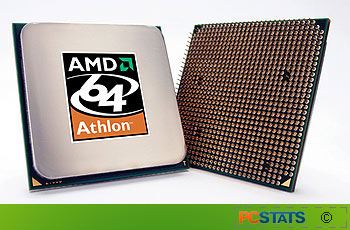64-bit processors have
registers that hold 64-bit values, double that of 32-bit processors. This
translates to the ability to hold larger integers (numbers) in a single
register, making operations involving massive numbers considerably faster.  It should also
lead to more precision in floating point numbers, except that current 32-bit
processors already support up to 80-bit floating-point values in a single
register. The major advantage of 64-bit computing is not in mathematical speed
though, but in the amount of memory that a 64-bit processor is able to address,
and consequentially use.
It should also
lead to more precision in floating point numbers, except that current 32-bit
processors already support up to 80-bit floating-point values in a single
register. The major advantage of 64-bit computing is not in mathematical speed
though, but in the amount of memory that a 64-bit processor is able to address,
and consequentially use.
Memory addresses are run
through the processor just like any other value, meaning they are stored in the
registers. The largest integer number a 32-bit register can hold is around -2.1
to +2.1 billion. This translates to a maximum of 4GB of physical memory.
Various workarounds have been
invented for the server market to transcend this limitation, but all sacrifice
performance. 64-bit registers can effectively address up to 16 terabytes of
physical memory which, to paraphrase Bill Gates, ought
to be enough for anybody.
It should be noted at this
point that 64-bit computing is specific to the operation of the processor and
the software that is feeding it, not the other computer hardware in a system.
There are no special '64-bit' computer memory chips or other peripherals. The
AMD Athlon 64 processor uses the same PC hardware as conventional 32-bit
systems.
AMD hit a home run in April of
2003 when it introduced its first line of 64-bit processors. The Opteron line
was significant in that it allowed businesses the chance to upgrade towards the
future of Windows (or the present day of Linux) without having to rejig their
entire setup. Up until that point, the only 64-bit solution was Intel's
expensive Itanium processor. The Itanium was powerful, but could not run
existing 32-bit code natively. This meant businesses either had to adapt their
software to work with the 64-bit Itanium and a 64-bit operating system, or
purchase new applications that could. Needless to say, neither option is efficient or
affordable.
The AMD Opteron was
revolutionary in that it supported the traditional x86 architecture and 32-bit
code that PC processors have been chewing on for years, in addition to software
written specifically for 64-bit processors. This allowed businesses the luxury
of upgrading their existing server hardware without the attending compatibility
worries.
AMD64 - AMD's No Mess Solution for 64-bit
AMD achieved this by extending
the x86 architecture to support their 64-bit processors, calling the resulting
hybrid 'AMD64.' The AMD64 architecture allows for processors with two completely
separate modes of operation.
